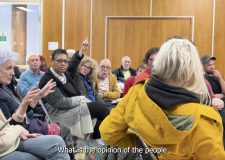The Right Lines
Brighton and Hove’s reputation as a digital city could help win crucial cash for faster broadband

When the railway pioneers chose to build a line to Brighton, it was already the most popular seaside resort in the country with 2,000 visitors a week. And those running the town had been pushing to join the railway revolution with increasing zeal. After three years of work the first train arrived in 1841.
Journey times were an hour and three quarters. This was much faster than the limited alternatives. Visitor numbers soared. Commuting became possible. And the population boomed. While the poor were with us then, and remain so today, the coming of the railway brought more widespread wealth.
Today Brighton and Hove is once again at a pivotal point in its history. The city is expected to bid for up to £10 million to fund a big expansion of ultrafast broadband. Brighton was among the first places in Britain to latch on to the potential of the internet in the early 1990s. And it has won a reputation as a digital city. It now needs to upgrade the infrastructure to match its reputation and ambitions.
If a bid by the council succeeds, the government is likely to award between £5 million and £10 million, matched by a similar sum from the likes of BT or Virgin. It would mean more free Wi-Fi in public places. Smartphones would download information more quickly. And individuals and businesses in the growing digital, media and creative sector would be among the many to benefit.
Ultrafast broadband offers operating speeds of at least 80 megabits per second (Mbps) – three times quicker than widely available superfast broadband. Council leader Jason Kitcat said: “A key strength of our economy is creative and digital media industries. But to maintain and grow this we must develop a world-class IT infrastructure. That means the fastest possible internet connections and making these available more widely, including to people on the move. Spending a relatively small sum on this bid could reap massive returns in government and private sector investment and, ultimately, in jobs.”
Wired Sussex, a key player in the digital sector, is helping the council with its application. The council expects the cost of bidding to be about £150,000. An earlier bid failed, with the money going to bigger cities. It prompted a campaign to help places such as Brighton which were geared up but missed out.
The government minister Ed Vaisey, whose brief includes communications and the creative industries, has already praised the lobbying by Brighton and Hove’s three MPs on this issue. And during their lobbying, he accepted an invitation from Brighton Pavilion MP Caroline Lucas to return to the city in September for the Digital Festival.
Let’s hope it bodes well. If so, Brighton and Hove can expect more Wi-Fi transmitters mounted on council buildings and lamp posts. And ultrafast cable broadband sites in places such as the New England and North Laine Business Quarter, the Lewes Road “academic corridor” and around Brighton and Hove railway stations. Chancellor George Osborne is due to announce the ten successful bidders – out of a possible 27 – when he makes his autumn statement which is usually in November (although last year it was in early December).
Just as our Victorian forefathers were forward-thinking enough to pay for the railways, improve the roads and invest in the sewers which carry our waste to the sea, so we need to look ahead. There is still a need for traditional infrastructure – hence Southern Water’s huge storm tunnels along the seafront and waste treatment works in Peacehaven, calls for a second Brighton Main Line to London and the roadworks starting on the A23 between Warninglid and Handcross Hill next week.
It would be wrong to overlook the continuing importance of these crucial networks. Equally it would be wrong to underestimate the importance of the online networks that will bring jobs, wealth and other opportunities too. We need ultrafast broadband as the infrastructure to connect us to tomorrow’s world, we need it soon and we need to make it work for the good of us all.




















